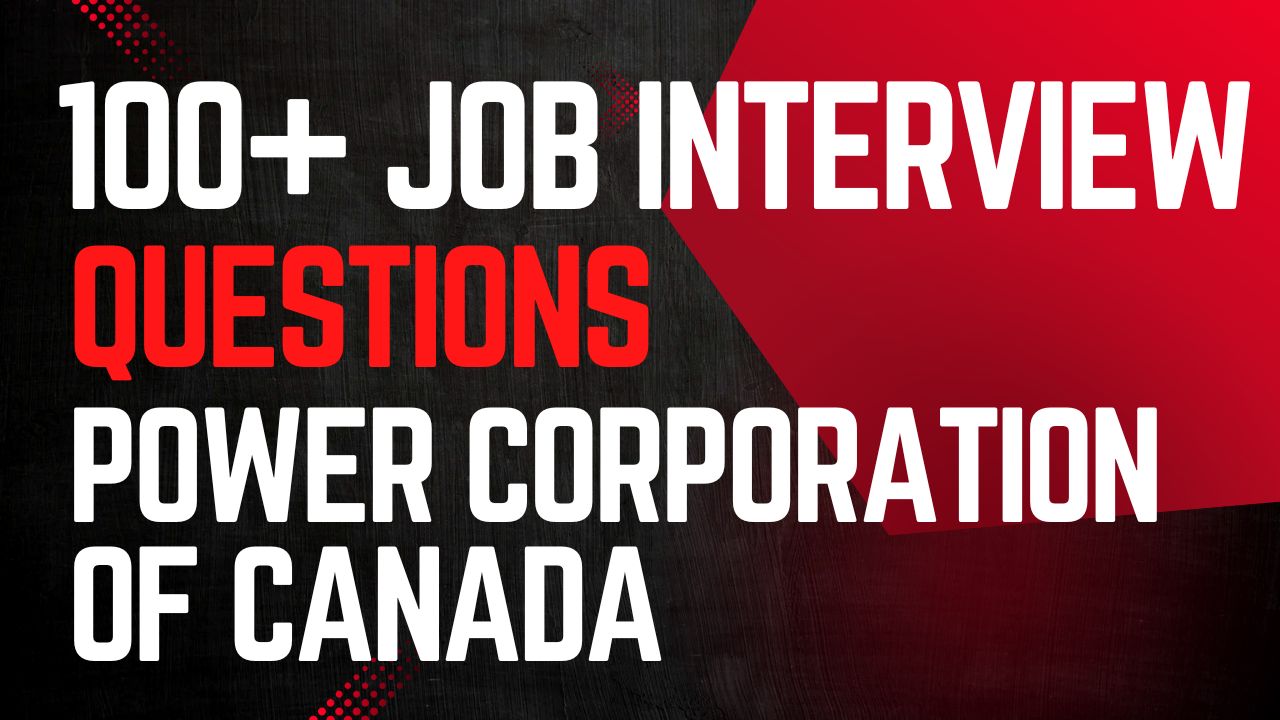100 Job Interview Questions for Power Corporation of Canada: Essential Insights for Success

Getting ready for a job interview can be challenging, especially with a large company like Power Corporation of Canada. Knowing what to expect is crucial for your success. This blog post will provide you with 100 common interview questions that can help you prepare effectively and boost your confidence.
Power Corporation of Canada is a leader in financial services and holds a strong position in the industry. Understanding their values and company culture will help tailor your answers during the interview. The questions in this article cover various topics, allowing you to practice and refine your responses. This post covers 100 Job Interview Questions for Power Corporation of Canada.
Being well-prepared is key to making a positive impression. You will find questions that challenge your skills and experience, along with those that explore your personality and fit within the company. This preparation can significantly increase your chances of landing the job you want.
Key Takeaways
- Familiarize yourself with Power Corporation of Canada’s culture and values.
- Review common interview questions to enhance your preparation.
- Tailor your answers to reflect your qualifications clearly.
Company Overview Power Corporation of Canada
Power Corporation of Canada is a large investment company with a diverse portfolio. The company has a rich history and has grown significantly since its inception.
History of Power Corporation of Canada
Power Corporation of Canada was founded in 1925. The company started as a holding firm for hydroelectric and other energy-related investments. Over the years, it expanded into various sectors, including financial services and communications.
In the 1960s and 70s, Power Corporation began acquiring interests in several companies.
Today, Power Corporation remains a significant player in the Canadian economy. Its focus on diversification and long-term stability continues to drive its success.
100 Common Interview Questions Power Corporation of Canada
- Can you tell me about yourself?
- What interests you about this job?
- Why do you want to work for Power Corporation of Canada?
- What are your greatest strengths?
- What is your biggest weakness?
- How do you handle stress?
- Tell me about a challenge you faced at work.
- Why did you leave your last job?
- Where do you see yourself in five years?
- Describe your ideal work environment.
- How do you prioritize your tasks?
- What motivates you to perform well?
- Describe a time you worked in a team.
- How do you handle conflict?
- What are your salary expectations?
- What skills make you a good fit for this position?
- How do you stay organized?
- Tell me about a time you showed leadership.
- What do you know about Power Corporation of Canada?
- How do you approach problem-solving?
- Describe your experience with [specific software or tool].
- What do you consider to be your most significant achievement?
- How do you gather feedback?
- What are your career goals?
- Tell me about a time you failed at a task.
- How do you adapt to change?
- What is your approach to meeting deadlines?
- Can you explain a complex idea in simple terms?
- How do you handle criticism?
- What do you like to do outside of work?
- Describe a time you made a mistake.
- How do you keep updated with industry trends?
- What role do you usually take in team projects?
- How would you describe your work style?
- Can you provide an example of your customer service skills?
- What do you expect from your manager?
- Tell me about a time you went above and beyond at work.
- How do you work with difficult team members?
- How do you set goals for yourself?
- Why should we hire you?
- Describe a time you had to learn something quickly.
- How do you handle tight deadlines?
- What is your greatest professional achievement?
- How would you define success?
- Describe your experience with [another relevant skill/field].
- What are your thoughts on teamwork?
- How do you keep motivated during repetitive tasks?
- What do you think makes a good leader?
- Tell me about a time your opinion was challenged.
- What are your biggest professional regrets?
- How do you ensure quality in your work?
- What do you think is the most challenging part of this job?
- How do you manage your time effectively?
- What did you like most about your last job?
- How do you handle competing priorities?
- Can you describe your work ethic?
- What would your previous employer say about you?
- How do you evaluate your own performance?
- Describe your experience managing projects.
- What skills do you want to develop?
- How do you maintain a work-life balance?
- What type of work culture do you thrive in?
- How would you handle a situation with an unhappy client?
- Can you describe a time you had to persuade someone?
- What is your preferred method of communication?
- How do you approach setting a budget?
- Tell me about a project you are passionate about.
- What are your thoughts on feedback?
- Describe your experience in a leadership role.
- How do you celebrate your achievements?
- When do you consider it appropriate to take risks?
- How do you ensure effective communication in a team?
- What strategies do you use for conflict resolution?
- Describe a time you helped improve a process.
- How do you feel about remote work?
- Can you tell me about a successful presentation you gave?
- What is your approach to networking?
- How do you build rapport with colleagues?
- What qualities do you look for in a teammate?
- Describe a difficult decision you made.
- How can you contribute to our company culture?
- What challenges do you think our industry faces?
- How do you prioritize learning new skills?
- Can you describe a time you had to mentor someone?
- What do you want your legacy to be?
- How do you handle a heavy workload?
- Describe your ideal career path.
- What tools do you use for planning?
- What do you enjoy most about your work?
- How do you stay focused on long-term goals?
- What are you looking for in your next role?
- How would you assess the success of a project?
- What does collaboration mean to you?
- How do you handle uncertainty at work?
- Describe a time when you exceeded expectations.
- What is your approach to diversity and inclusion?
- How do you keep your team engaged?
- What values are most important to you in a workplace?
- Can you give an example of your analytical skills?
- Why do you think you will be successful in this role?
Interview Preparation
Preparing for your interview with Power Corporation of Canada is essential. Understanding the job description and crafting your value proposition will help you stand out.
Understanding Job Description Power Corporation of Canada
Start by carefully reviewing the job description for the position you are applying for. Identify key responsibilities, required skills, and qualifications. This helps you understand what the employer values most.
Make a list of specific tasks mentioned. For example, if the role requires project management skills, think about your past experiences that demonstrate this ability.
Look for any keywords in the description. Keywords like “teamwork,” “communication,” or “analytical skills” should guide your responses. Aligning your answers with these keywords shows you are a good fit.
Crafting Your Value Proposition
Your value proposition explains why you are the right choice for the job. Focus on your skills and experience that relate to the job.
Begin by summarizing your strengths in a few sentences. Highlight achievements in previous roles that are relevant to Power Corporation of Canada. Use examples to show your impact, like increasing sales by a certain percentage.
Think about what makes you unique. This could be your ability to solve problems or adapt to new situations. Practice delivering this information smoothly during the interview. Structuring your thoughts clearly helps you communicate your value effectively.
Frequently Asked Questions
In interviews, you will likely be asked about your experience with projects, industry knowledge, decision-making skills, handling conflicts, and teamwork. Be prepared to provide specific examples and demonstrate your skills in these areas.
Can you discuss a challenging project you’ve managed and how you ensured its success?
Think of a project where you faced difficulties. Explain the challenges and how you approached them. Highlight the strategies you used to keep the project on track, involving teamwork, communication, and problem-solving.
How do you stay current with regulations and advances in the power industry?
Show your commitment to ongoing learning. Discuss the resources you use, such as industry publications, online courses, and professional networks. Mention how this knowledge helps you in your day-to-day responsibilities.
Describe a time when you had to make a decision without all the necessary information. How did you handle it?
Share a specific situation where you had to act with limited data. Explain your thought process and the steps you took to gather additional information if possible. Focus on the outcome of your decision and what you learned.
How would you handle a situation where you disagree with a supervisor’s decision or policy?
Discuss your approach to addressing disagreements professionally. Talk about the importance of communication and seeking to understand the supervisor’s perspective. Mention how you might express your concerns respectfully.
Can you give an example of how you’ve worked effectively as part of a team in a professional setting?
Provide a clear example of a successful team project. Highlight your role and contributions. Focus on collaboration, how you supported your teammates, and the overall impact of the team’s efforts on the project’s success.











